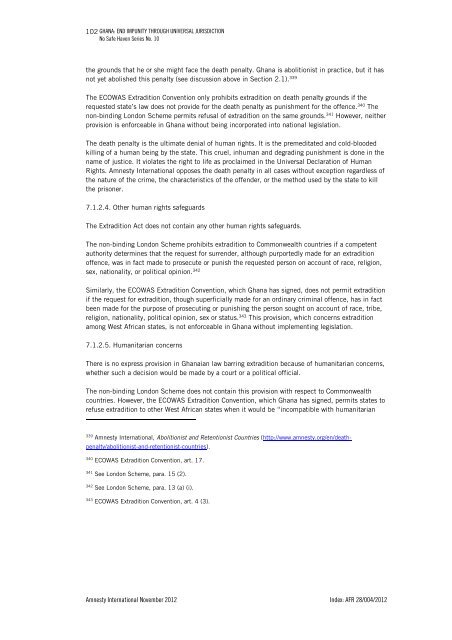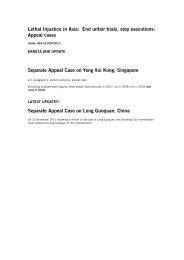Ghana - Amnesty International
Ghana - Amnesty International
Ghana - Amnesty International
You also want an ePaper? Increase the reach of your titles
YUMPU automatically turns print PDFs into web optimized ePapers that Google loves.
102 GHANA: END IMPUNITY THROUGH UNIVERSAL JURISDICTIONNo Safe Haven Series No. 10the grounds that he or she might face the death penalty. <strong>Ghana</strong> is abolitionist in practice, but it hasnot yet abolished this penalty (see discussion above in Section 2.1). 339The ECOWAS Extradition Convention only prohibits extradition on death penalty grounds if therequested state’s law does not provide for the death penalty as punishment for the offence. 340 Thenon-binding London Scheme permits refusal of extradition on the same grounds. 341 However, neitherprovision is enforceable in <strong>Ghana</strong> without being incorporated into national legislation.The death penalty is the ultimate denial of human rights. It is the premeditated and cold-bloodedkilling of a human being by the state. This cruel, inhuman and degrading punishment is done in thename of justice. It violates the right to life as proclaimed in the Universal Declaration of HumanRights. <strong>Amnesty</strong> <strong>International</strong> opposes the death penalty in all cases without exception regardless ofthe nature of the crime, the characteristics of the offender, or the method used by the state to killthe prisoner.7.1.2.4. Other human rights safeguardsThe Extradition Act does not contain any other human rights safeguards.The non-binding London Scheme prohibits extradition to Commonwealth countries if a competentauthority determines that the request for surrender, although purportedly made for an extraditionoffence, was in fact made to prosecute or punish the requested person on account of race, religion,sex, nationality, or political opinion. 342Similarly, the ECOWAS Extradition Convention, which <strong>Ghana</strong> has signed, does not permit extraditionif the request for extradition, though superficially made for an ordinary criminal offence, has in factbeen made for the purpose of prosecuting or punishing the person sought on account of race, tribe,religion, nationality, political opinion, sex or status. 343 This provision, which concerns extraditionamong West African states, is not enforceable in <strong>Ghana</strong> without implementing legislation.7.1.2.5. Humanitarian concernsThere is no express provision in <strong>Ghana</strong>ian law barring extradition because of humanitarian concerns,whether such a decision would be made by a court or a political official.The non-binding London Scheme does not contain this provision with respect to Commonwealthcountries. However, the ECOWAS Extradition Convention, which <strong>Ghana</strong> has signed, permits states torefuse extradition to other West African states when it would be “incompatible with humanitarian339<strong>Amnesty</strong> <strong>International</strong>, Abolitionist and Retentionist Countries (http://www.amnesty.org/en/deathpenalty/abolitionist-and-retentionist-countries).340ECOWAS Extradition Convention, art. 17.341See London Scheme, para. 15 (2).342See London Scheme, para. 13 (a) (i).343ECOWAS Extradition Convention, art. 4 (3).<strong>Amnesty</strong> <strong>International</strong> November 2012 Index: AFR 28/004/2012
















